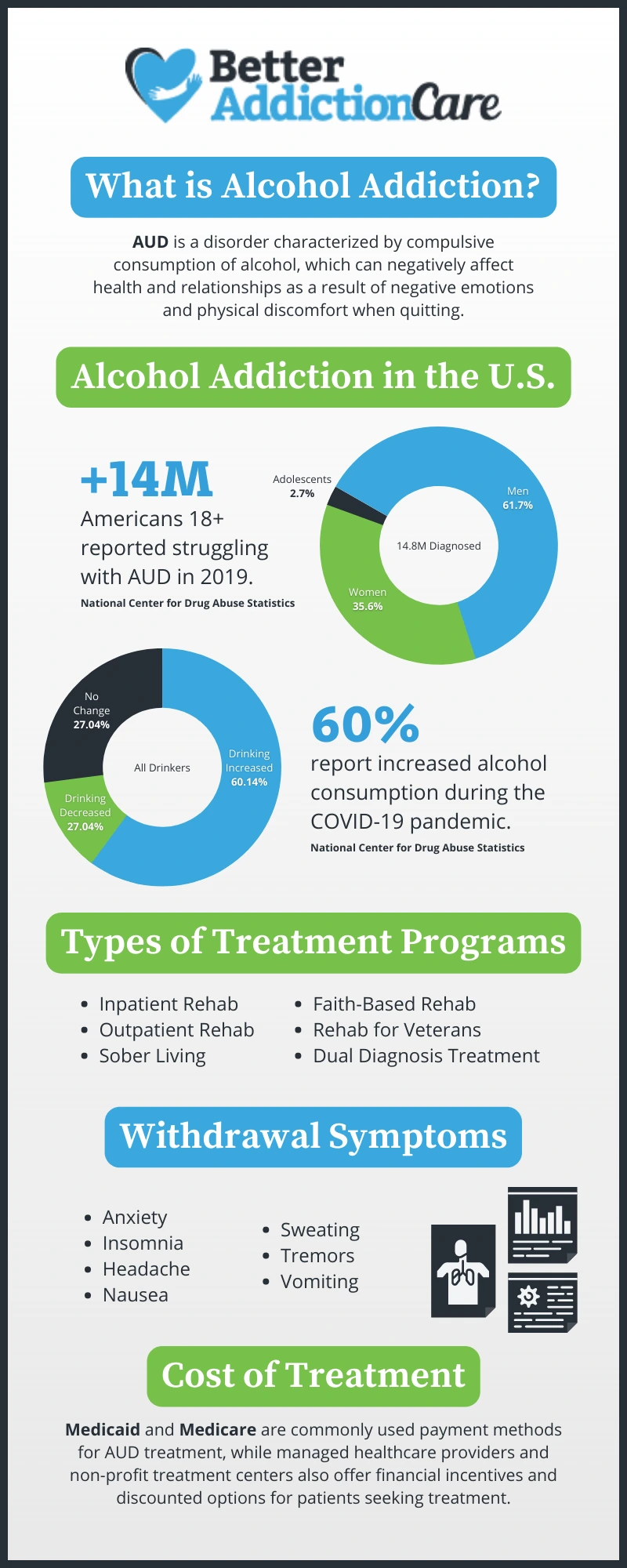How to Define Alcohol Addiction

Alcoholism, also known as Alcohol Use Disorder (AUD), is a long-term condition that is characterized by the compulsive drinking of alcohol regardless of the adverse consequences it might carry. This type of addiction comprises -as many others-physical dependence, tolerance, and withdrawal manifestations on cessation of use.
Individuals suffering from AUD have a high degree of difficulty in controlling the quantity of alcohol that they consume, and they continue to drink despite the presence of negative effects on their health, life, and community in general.
What are the Signs or Symptoms of Someone Has an Alcohol Addiction?
There are signs someone can give that could mean this person is suffering from an alcohol addiction. Common signs include:
- Further tolerance to alcohol, a need to drink more to get proper effects.
- Secret drinking.
- Failure or inability to control drinking despite wanting or attempting to do so.
- Anxiety when not drinking.
- Withdrawal symptoms are common when not drinking, which may include nausea, sweats, shakes, or anxiousness.
- Neglecting home, work, or school duties as a result of drinking.
- Persistence alcohol consumption may be damaging to relationships and health.
- Not doing or not getting enjoyment out of things that were once enjoyable or important to the person if these do not include drinking.
- Alcoholism as a coping mechanism for stress, anxiety, emotional pain, or any other emotions.
When you see signs in someone you know, it is important to approach the situation kindly so that they feel comfortable talking to you and that you can even assist them in looking for help. Support from relatives or treatment providers can play a vital role in steering people toward alcohol addiction recovery.
How is Alcohol Addiction Diagnosed?
Doctors use pre-established and well-known diagnostic criteria for Alcohol Use Disorder (AUD), called the Diagnostic and Statistical Manual of Mental Disorders (DSM-5). These criteria serve as a starting point for looking for signs and symptoms that can indicate the presence of an alcohol addiction, including:
Impaired Control:
Problems with managing alcohol consumption, like drinking more than planned or the inability to reduce or stop drinking despite attempts.
Social Impairment:
Alcohol use causes considerable social or interpersonal consequences, such as conflicts with family members, friends, or co-workers because of drinking.
Risky Use:
Harmful behavior is common in alcohol use despite knowing the physical or psychological risks associated with it, for example, driving under the influence, engaging in risky sexual behavior, or drinking in hazardous situations.
Tolerance:
Tolerance is the need for increased quantities of alcohol to produce the same effects or diminished effects with the continued use of the same amount of alcohol.
Withdrawal Symptoms:
Withdrawal occurs when alcohol use is cut down or stopped and can include shakiness, vomiting, nervousness, sweating, or insomnia. Alcohol withdrawal symptoms can become a medical emergency due to life-threatening health implications. This could happen with less than 48 hours of abstinence.
Time and Energy:
The time spent acquiring, using, or recovering from alcohol use may disrupt social, occupational, and recreational activities.
Neglected Activities:
Alcohol use may lead to neglecting significant social, occupational, or recreational activities, selecting drinking over other duties, and impacting different social interactions.
AUD could be diagnosed as mild when the person has 2 or 3 of the mentioned signs/symptoms, moderate when there are 4 to 5 signs/symptoms, and severe when there are 6 or more signs/symptoms. These criteria allow clinicians to evaluate and diagnose alcoholism and to decide the right treatment and intervention approaches to support individuals in their recovery process.
What are The Precipitating Factors of an Alcohol Addiction?
Several factors determine an increased risk of alcohol addiction.
- Genetics is a significant factor, with family history determining the vulnerability.
- Early alcohol exposure, mainly at the time of adolescence, may change the pattern of brain development and hence increase the chances of addiction in the future.
- Environmental causes, like children growing up in areas where alcohol abuse is prevalent.
- The risk is elevated by peer pressure and the easy availability of alcohol.
- Mental health issues that are co-occurring, like depression or anxiety, could make people drink alcohol.
- Trauma, especially sexual abuse experiences, can result in alcohol abuse as a defense mechanism.
- Stress and particular personality features such as impulsivity or sensation-seeking behavior are among those factors that make alcohol addiction more likely.
The fact that these risk factors are present does not mean an addiction, but knowing them helps to recognize people who could be more susceptible. This awareness makes it possible to focus interventions and support on either the prevention or correction of problematic drinking behaviors.
Is Alcohol Addiction Concerning?
Alcohol addiction is, indeed, concerning, as it affects the life of an individual in many ways. Nevertheless, beyond the instant effects of poor judgment and stressed relationships, alcohol addiction holds profound threats to physical health, mental health, and quality of life in general.
What Are the Health Risks of AUD?
Physiologically, alcohol addiction can be very demanding. The long-term impact of alcohol abuse includes life-threatening diseases in the form of liver disease, cardiovascular diseases, and an increased incidence of certain cancers. Besides, people may have withdrawal signs, such as the deadly delirium tremens, which include severe confusion, hallucinations, and seizures.
Cognitively, alcohol addiction is frequently mixed with mental health disorders, in which its symptoms worsen and its treatment becomes more complicated. Anxiety, depression, and trauma-related complaints are a joint group of comorbidities. The continuous abuse of alcohol can also cause cognitive deficiency and memory loss, therefore diminishing a person's welfare.
Additionally, alcoholism puts too much pressure on social relationships, causing isolation, broken bonds, and shame or guilt. Legal issues, unstable financial status, and poor decision-making further complicate the issues that are faced by individuals trying to overcome addiction.
At its most severe, alcohol addiction can result in some conditions, such as Wernicke-Korsakoff syndrome, which is a neurological disorder that causes serious memory loss, confusion, and changes in vision, among other things. These complications highlight the necessity of taking a comprehensive approach to the problem of alcohol addiction.
When to See a Doctor?
Because of the severe risks, one has to treat the problem of alcohol addiction sympathetically and with support. Proper intervention, kind treatment, and continuous support can help people break the chains of addiction, regain their lives, and develop a successful recovery.
Which Are the Treatments Available?
Alcohol Use Disorder (AUD) treatment is multi-modal and involves evidence-based approaches that are customized to the patient’s requirements and choices. These approaches include:
1. Medications:
FDA-approved medications do play a significant role in helping people cut down on drinking or even abstain from it. These are naltrexone (available as a powder that is taken orally and a long-acting injectable), acamprosate, and disulfiram. Isolated or as part of combination therapy, these medications have been proven to be effective in aiding recovery.
2. Behavioral Treatments:
Behavioral treatments, also called alcohol counseling or talk therapy, are offered by qualified therapists and address the modification of drinking behavior. For instance, brief interventions, reinforcement-based strategies, and treatment whose focus is on motivation enhancement and coping skill development. Also, mindfulness-oriented therapies can help in dealing with the root problems causing alcohol use.
3. Mutual-Support Groups:
Peer support groups, such as Alcoholics Anonymous (AA) and SMART Recovery, provide support to those who want to stop or reduce drinking. These groups are supportive and sympathetic while providing a common experience, making them a great asset to those in recovery. They are available in different forms, including online meetings.
4. Holistic Approaches:
Living a healthy life that includes exercise, diet, sleep, and stress reduction can support the recovery process from alcoholism. Other holistic modalities, including mindfulness meditation, yoga, and art therapy, may also be adjunctive to orthodox treatment modalities.
5. Aftercare and Continuous Support:
Recovery maintenance is essential for individuals, particularly after completing formal treatment programs. This “maintenance mode” helps to continuously check the mind and body to ensure sobriety and prevent relapse. Aftercare can also include joining support groups, keeping up with the therapy, regular health care provider checks, and community resources, and could be necessary for years to come.
Alcohol use disorder (AUD) treatment can be provided in outpatient and inpatient settings by specialty programs, therapists, and healthcare providers. It must be noted that there is no one-size-fits-all solution, and the best go-to is comprehensive support therapy with the integration of medications, behavioral therapies, and mutual support groups.
In extreme cases, some people might drink rubbing alcohol, which is way more dangerous than drinkable alcohol.
Where to Look for Help?
Seeking help to overcome alcohol addiction can be done in many ways. Healthcare providers start with an initial assessment and then guide treatment. Primary care physicians, mental health specialists, and other providers are fundamental to treating alcoholism.
Usually, the treatment is centered on comprehensive therapy. Physicians could prescribe medications. Therapists and counselors who are licensed to deal with addiction usually offer individual therapy to tackle the root causes of alcohol addiction.
Support groups, including Alcoholics Anonymous (AA) and SMART Recovery offer a group that helps patients connect with others who understand their difficulties and offer them much-needed support during their recovery process.
Through these differing approaches to help, people can obtain a blend of support that suits them and their situation, leading them to the road of recovery from alcoholism.




